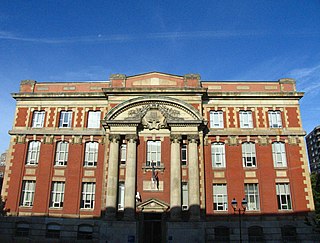
Michel Tremblay is a Québécois novelist and playwright.

Quebec French, also known as Québécois French, is the predominant variety of the French language spoken in Canada. It is the dominant language of the province of Quebec, used in everyday communication, in education, the media, and government.

The Office québécois de la langue française (Canadian French:[ɔˈfɪskebeˈkwɑdəlalãɡfʁãˈsaɪ̯z] is an agency of the Quebec provincial government charged with ensuring legislative requirements with respect to the right to use French are respected.

The culture of Quebec emerged over the last few hundred years, resulting predominantly from the shared history of the French-speaking North American majority in Quebec. Québécois culture, as a whole, constitutes all distinctive traits – spiritual, material, intellectual and affective – that characterize Québécois society. This term encompasses the arts, literature, institutions and traditions created by Québécois, as well as the collective beliefs, values and lifestyle of Québécois. It is a culture of the Western World.

This section of the Timeline of Quebec history concerns the events between the Quiet Revolution and the patriation of the British North America Act.
This is an article about literature in Quebec.
An anglicism is a word or construction borrowed from English by another language. With the rise in Anglophone media and the global spread of British and US colonialism in the 20th century and cultures in the 21st century, many English terms have become widespread in other languages. Technology-related English words like internet and computer are prevalent across the globe, as there are no pre-existing words for them. English words are sometimes imported verbatim and sometimes adapted to the importing language in a process similar to anglicisation. In languages with non-Latin alphabets, these borrowed words can be written in the Latin alphabet anyway, resulting in a text made up of a mixture of scripts; other times they are transliterated. Transliteration of English and other foreign words into Japanese generally uses the katakana script.
This article presents the current language demographics of the Canadian province of Quebec.
Quebec French is different in pronunciation and vocabulary to the French of Europe and that of France's Second Empire colonies in Africa and Asia.
There are various lexical differences between Quebec French and Metropolitan French in France. These are distributed throughout the registers, from slang to formal usage.
Articles related to Quebec include:
Francization or Francisation, also known as Frenchification, is the expansion of French language use—either through willful adoption or coercion—by more and more social groups who had not before used the language as a common means of expression in daily life. As a linguistic concept, known usually as gallicization, it is the practice of modifying foreign words, names, and phrases to make them easier to spell, pronounce, or understand in French.
The phonology of Quebec French is more complex than that of Parisian or Continental French. Quebec French has maintained phonemic distinctions between and, and, and, and. The latter phoneme of each minimal pair has disappeared in Parisian French, and only the last distinction has been maintained in Meridional French though all of those distinctions persist in Swiss and Belgian French.
Les Belles-sœurs is a two-act play written by Michel Tremblay in 1965. It was Tremblay's first professionally produced work and remains his most popular and most translated work. The play has had a profound effect on Quebec language, culture and theatre.
Montreal was referred to as "Canada's Cultural Capital" by Monocle Magazine. The city is Canada's centre for French-language television productions, radio, theatre, film, multimedia, and print publishing. The Quartier Latin is a neighbourhood crowded with cafés animated by this literary and musical activity. Montreal's many cultural communities have given it a distinct local culture.
Canadian French is the French language as it is spoken in Canada. It includes multiple varieties, the most prominent of which is Québécois. Formerly Canadian French referred solely to Quebec French and the closely related varieties of Ontario (Franco-Ontarian) and Western Canada—in contrast with Acadian French, which is spoken by Acadians in New Brunswick and some areas of Nova Scotia, Prince Edward Island and Newfoundland & Labrador.

Henri Wittmann is a Canadian linguist from Quebec. He is best known for his work on Quebec French.
Magoua is a particular dialect of basilectal Quebec French spoken in the Trois-Rivières area, between Trois-Rivières and Maskinongé. Long before a military fort was constructed there, Trois-Rivières became in 1615 the first stronghold of the coureurs des bois outside the city of Québec. Magoua is the ethnonym applied to their descendants in the area. Magoua is the most conservative of all Quebec French varieties, including Joual. It preserves the sontaient ("étaient") characteristic of Métis French and Louisiana French, has a creole-like past tense particle tà and has old present-tense contraction of a former verb "to be" that behave in the same manner as subject clitics.
Métis French is one of the traditional languages of the Métis people along with Michif and Bungi, and is the French-dialect source of Michif.

The Théâtre du Rideau Vert is a theatre in Montreal, Quebec, Canada. It is located at 4664 Saint Denis Street in the borough of Le Plateau-Mont-Royal.